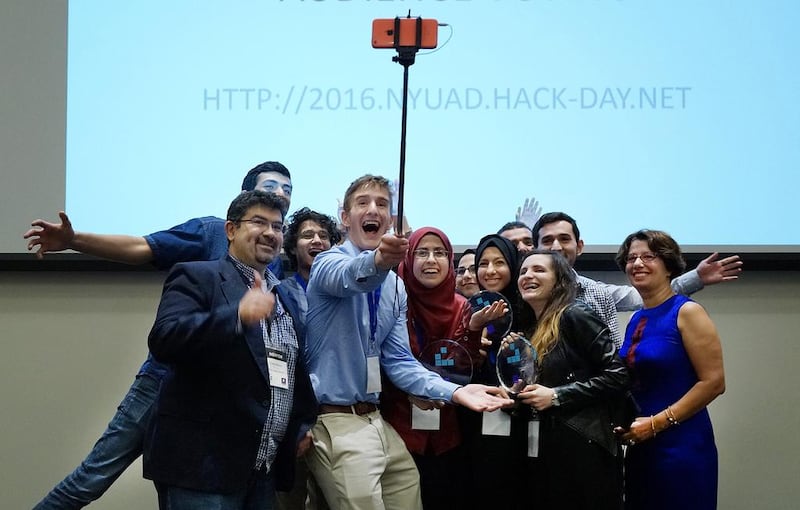Annual hackathon won by students who used crowdsourcing as an inspiration to create app that offers affordable translations of texts and increases employment in Arab world.
The team of students that won an international hackathon in Abu Dhabi created a functional app that not only digitises Arabic literature, but tackles unemployment – and they did it all in just three days.
The application Arabic Snippets, or Qusasat in Arabic, was put before a panel of judges on Sunday as part of New York University Abu Dubai’s (NYUAD) fifth annual International Hackathon for Social Good in the Arab World.
Qusasat was designed to address two issues: converting pictures of older, typed Arabic texts into digital formatting; and high unemployment levels across the Arab world.
“We were inspired by the current trend in tech of crowdsourcing,” said 18-year-old team member Will Held.
“So we made an application where we get a text from – let’s say the library here. They send us an image of an old book. Then, we chop that book into a bunch of little pictures of words and those words then go to the app that we developed, as our user interface for the hackathon.”
Users could then view those snippets, transcribe them using their keyboards and submit back through the app – which would then bring everything together and digitise the whole text.
“Right now,” said the NYU Abu Dhabi computer science student, “if you want to digitise an Arabic text, you have to pay a typist about US$500 (Dh1,836) per book. With our system, you could do that for $125 and all of that is going directly to people across the Arab world.”
The team’s success is a strong example of a good “hack”, said Sana Odeh, NYUAD’s clinical professor of computer science and hackathon organiser.
“Hackers, those who hack into other computers, appropriated the term [hackers] from where people or companies used to come together and create a prototype. Now we’re reappropriating the term.”
NYUAD’s hackathon featured 110 students in 15 teams representing leading universities such as MIT, Stanford, Columbia, Harvard and NYU.
Contestants hailed from across the planet, including Europe, the Middle East, India and Sri Lanka.
To win, teams had to show front-end and back-end development skills. The front-end represents the design and user-experience side of things, while the back-end is the functional core.
Mr Held said one of the biggest technical challenges his team faced was the need to acquire a user base. To facilitate this, they adopted a platform called Ionic, which allows programmers to design apps quickly for multiple platforms – such as iOS, Android and web browsers.
“At the start of the hackathon we had only one member who had worked with Ionic previously, so a bunch of us had to learn how to use that and get it up and running really quickly,” he said.
Another back-end challenge the team faced was cutting up the text and recombining it.
They overcame the challenges, producing not just a professional-looking app, but one that could reattach all segments with 98 per cent accuracy.
Throughout the competition, students were aided by mentors from tech giants, including Google, Microsoft, Facebook, Amazon and Twitter.
Mr Held said his team had a lot of technical ideas from the start, but its three mentors greatly aided in allocating appropriate roles to everyone.
The team was divided into three subgroups – one working on cutting everything up, one on the app itself and another on recombining everything.
“By the second day we were working together as if we’d been doing so for a long time,” said the American student.
Two of his most significant contributions to the project were figuring out how to make the business model sustainable, and drawing upon his theatre background as one of the team’s two final presenters.
He began coding when he was 14 years old. “I didn’t have anything to do one summer so I learnt how to code,” he said.
However, the hackathon was the farthest he has deviated from pure computer science research, towards something more consumer-based, he said.
Ms Odeh said the competition aim was to teach competitors not just raw skills, but entrepreneurship, using computer science to solve problems in communities, as well as teamwork, flexibility, open-mindedness and how to scale ideas.
“Usually when you have a hackathon, by the end maybe one of the apps really works,” she said. “So far, we’ve had five hackathons and all of the teams succeeded in building a prototype, no matter the skill level of the team.”
While the second-placed team developed a personal assistant for refugees, Mr Held said that as someone who studied Arabic in high school, he was thoroughly impressed with the third-placed team, Fahmt.
This team focused on doing online Arabic translation, with a “unique twist”.
“An issue in Arabic, which a lot of language learners have, is when it’s typed on the internet, a lot of people use Arabese, where they use the Roman scripts to write Arabic.
“And in the colloquial dialect there’s not very much consistency in what’s written, so the team used a really cool system, which converted all of what’s written into what it sounds like phonetically, and then it translates based off what it sounds like.”
After the competition, Qusasat, which included eight team members from universities in five Arab countries, was approached by some of the judges, who expressed interest in investing in and supporting the project – a testament to the immense amount the team had achieved in such a short amount of time.
“If your issues are very important, it’s easy to come up with a very important application that you think can solve it, and when you have an important application, it’s really easy to motivate yourself to work and get a really good product done.”
halbustani@thenational.ae






